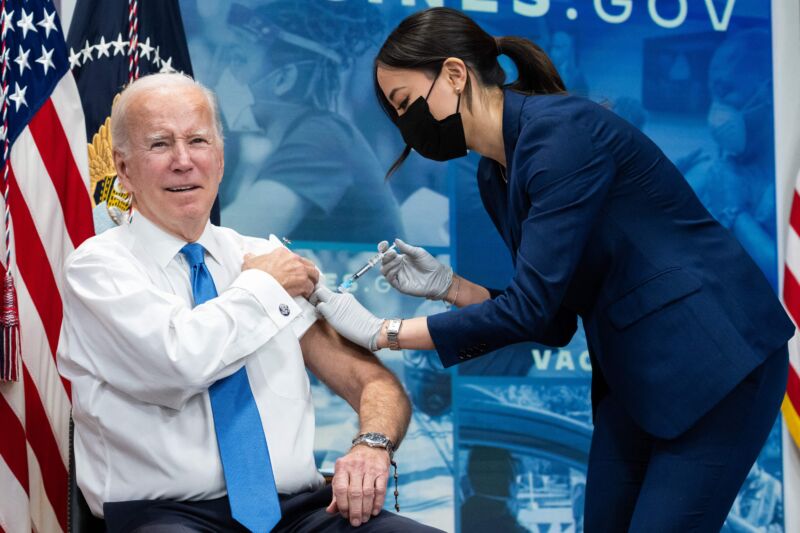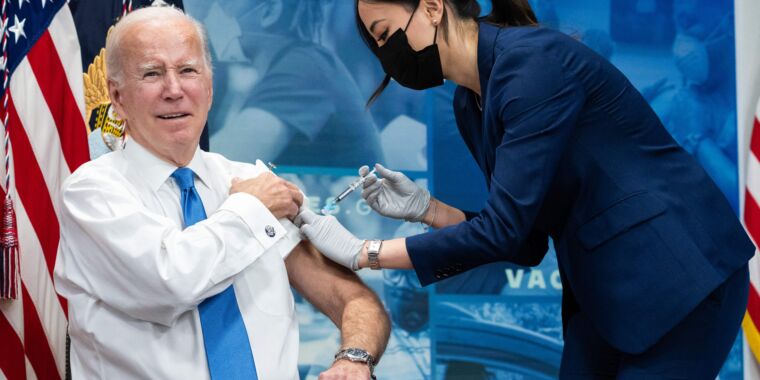Not looking good —
Nearly every COVID death is preventable, Biden stressed Tuesday.

The Biden administration is struggling to refocus the country’s attention back on the pandemic as the fall booster campaign drags and the latest models project that tens of thousands of Americans will needlessly die this winter of COVID-19.
“This year, nearly every [COVID-19] death is preventable,” President Biden said Tuesday just before rolling up his sleeve to receive his own updated COVID-19 booster.
Few Americans are following his lead. The White House has pushed Halloween as a soft deadline for Americans to get their updated, bivalent COVID-19 booster, arguing that such timing of the dose will allow for the immune system to mount maximal antibody and other immune responses before Americans begin gathering for fall and winter holidays, such as Thanksgiving, when transmission risks increase. But, with Halloween just days away, only 19.4 million Americans have received a bivalent booster—that’s just 6 percent of the people eligible for the shot, which is free and available to everyone ages 5 and above.
White House officials told The Washington Post that the administration is bracing for between 30,000 and 70,000 COVID-19 deaths this winter, nearly all of which would be preventable given vaccines, treatments, and tried-and-true health measures that reduce transmission, such as masking, improved ventilation, and distancing. The lower bound of the death toll estimate reflects current deaths, which are still averaging more than 350 per day.
Virologists, meanwhile, have been warning of coming winter waves fueled by immune-evading omicron subvariants vying for dominance. So far, BQ.1.1 and XBB stand out as the most concerning worldwide. BQ.1.1 is poised to become dominant in the US in the next several weeks, and experts say it could help drive a winter wave of infection here.
Plans and apathy
But, with the transmission of SARS-CoV-2 still high globally, there’s also the possibility of an unforeseen variant emerging and sweeping the planet as the original omicron—BA.1—did last year. Omicron didn’t grab international attention until the end of November 2021, but by late December, the ultratransmissible variant had already begun its rampant spread in the US, starting what would be the country’s largest wave of infections and hospitalizations of the pandemic and killing tens of thousands.
Given the bleak outlook, officials told the Post that White House Chief of Staff Ron Klain held an urgent meeting last week to try to reverse the country’s course. The outcome of the meeting was the “Fall Playbook,” announced Tuesday to try to boost booster uptake. The plan includes targeted outreach to get more seniors and other vulnerable people boosted; getting Walgreens, DoorDash, and Uber to work together to offer free delivery of COVID-19 treatments, such as Paxlovid, to underserved communities; and getting pharmacies to prod their customers about getting their fall shots.
But, epidemiologists have long noted that many of the administration’s actions have worked against their current efforts to get more Americans to take the ongoing pandemic seriously and stay up to date on their vaccinations. Generally, many have criticized the Centers for Disease Control and Prevention and the White House for shifting the focus of health policies from public health to personal choices and individual risk assessments. There was also the time last month when President Biden said, “The pandemic is over” on national television.
Recent polls show many Americans are apathetic about the state of the pandemic and disinclined to keep getting boosters. Some are also confused. In a Kaiser Family Foundation Poll last month, 40 percent of fully vaccinated adults said they didn’t know if the bivalent booster was recommended for them, and an additional 11 percent said it wasn’t. To be clear, bivalent boosters are recommended for all fully vaccinated adults, as well as fully vaccinated people ages 5 and up. A poll this month by Monmouth University found that only 33 percent of adults planned on getting a bivalent booster at some point.
